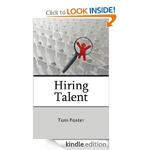“Tell me, Julian. Why did you pick this person out of the candidate pool? Is he really the best candidate for the open position on your team?” I asked.
“I don’t think you understand,” Julian replied. “I don’t only have to think about the best person for the job. I also have a budget to think about. I get a little spiff on gross margin, but my net to the bottom in my department makes up the biggest part of my bonus.”
“I am looking at the salary requirements of the three final candidates. They are all within the salary range for the position. Why did you pick this one? I know his salary requirement is $20,000 less than the other two candidates, but is that really why you picked him?”
“Well, the best candidate is the one from Missouri,” Julian explained. “Best experience, interviewed the best. He has already relocated here. But his salary requirements, that’s almost as much as I am making. I just don’t think we need that much horsepower in this role.”
“And, the candidate you picked?”
“You’re right, not as much experience, especially on the equipment system we use. He will require a little training, maybe some hand holding until he gets the hang of things.”
“And, this new candidate, if something happens to you, would he be able to take over your position in time?”
“Of course not,” Julian pushed back. “If something happened to me, it would be tough. The company would have to recruit someone from the outside. I have a big job. I wouldn’t be easy to replace me.”
